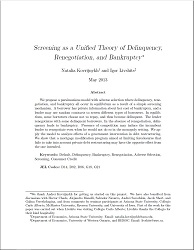Screening as a Unified Theory of Delinquency, Renegotiation, and Bankruptcy
Screening as a Unified Theory of Delinquency, Renegotiation, and Bankruptcy
Author(s): Natalia Kovrijnykh, Igor Livshits
Subject(s): Business Economy / Management, Socio-Economic Research
Published by: BEROC Belarusian Economic Research and Outreach Center
Keywords: Default; Delinquency; Bankruptcy; Renegotiation; Adverse Selection; Screening; Consumer Credit; D14; D82; D86; G18; G21;
Summary/Abstract: We propose a parsimonious model with adverse selection where delinquency, renegotiation, and bankruptcy all occur in equilibrium as a result of a simple screening mechanism. A borrower has private information about her cost of bankruptcy, and a lender may use random contracts to screen different types of borrowers. In equilibrium, some borrowers choose not to repay, and thus become delinquent. The lender renegotiates with some delinquent borrowers. In the absence of renegotiation, delinquency leads to bankruptcy. Presence of competition may induce the incumbent lender to renegotiate even when he would not do so in the monopoly setting. We apply the model to analyze effects of a government intervention in debt restructuring. We show that a mortgage modification program aimed at limiting foreclosures that fails to take into account private debt restructuring may have the opposite effect from the one intended.
Series: BEROC Miscellaneous Papers
- Page Count: 29
- Publication Year: 2013
- Language: English
- Content File-PDF

